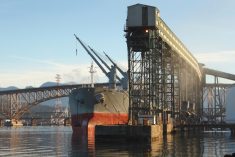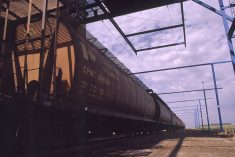Federal legislation sought by farm groups wanting improvements to rail service for the grain sector is on its way back from the Senate to the House of Commons.
Senators on Thursday afternoon passed Bill C-49, the Transportation Modernization Act, on third reading — but with several amendments proposed Wednesday by the standing Senate committee on transport and communications. The bill now goes back to the Commons to seek approval as amended.
Grain Growers of Canada, responding Thursday to the Senate’s adoption of the bill, described it as “imperative” that the Commons quickly pass the amended C-49.
Read Also

FMC Canada unveils 2026 crop protection roster
FMC Canada’s crop protection lineup for 2026 will include four products marketed for control of kochia.
Alberta’s wheat and barley commissions, in a separate release, also called for the Commons to pass the amended bill “as soon as possible so that passing the bill does not drag into the summer months.”
The Commons is currently adjourned until April 16.
“It’s clear the Senate heard farmers’ voices and did its job and provided sober second thought,” GGC president Jeff Nielsen said in a release.
C-49, as amended, “will provide meaningful tools that the shippers need to hold railways to account, increase competition and bring better rail service to the grain industry,” he said.
‘Reasonable direction’
Among its amendments, the Senate transport committee on Wednesday voted to add soybeans to the list of crops covered by the maximum revenue entitlement (MRE) — the so-called “revenue cap” which limits how much revenue Canada’s big two railways can keep from handling certain bulk crops.
The committee’s amendment strikes the words “except soybeans” from the “beans” portion of the schedule of MRE-covered crops.
The committee said Wednesday its amendments also grant “own motion” power to the Canadian Transportation Agency (CTA) to “proactively investigate whether a railway company is fulfilling its service obligations.”
Further, the committee said, its changes offer “greater transparency” for shippers seeking final-offer arbitration to challenge rail freight rates.
The committee also called for an amendment to “give farmers better access to long-haul rail interswitching so they can more easily get their goods to market.”
Interswitching rules commit one rail carrier to pick up cars from a shipper, then deliver them to another railway for the line haul. Where such rules today allow interswitching only within a limited distance from a shipper’s facility, C-49’s “long-haul” interswitching policy would allow shippers to apply for an interswitching order from the CTA.
The committee’s amendment tightens up C-49’s wording to allow a shipper to apply for long-haul interswitching, not only if the shipper has access to just one major railway’s rail lines at the point of origin or destination, but also if there’s access to only one railway’s lines in the “reasonable direction” of the traffic to be shipped.
‘Current backlog’
Prairie grain farmers in several regions have seen “significant” delays this year, the Alberta commissions said. In the poorest weeks, they said, rail car fulfillments have dropped to the “critical levels” seen during the major backlog of 2013-14.
“The legislation likely won’t fix the current backlog that farmers have experienced in several areas this year, but we are extremely pleased to have mechanisms in place that will help avoid this issue in the future,” Alberta Wheat Commission chair Kevin Bender said.
“Farmers rely almost entirely on freight rail transportation to move our products to our international customers and this legislation ultimately strengthens Canada’s position as a major grain exporter,” Alberta Barley chair Jason Lenz said Thursday in the same release.
Agricultural Producers Association of Saskatchewan, in a separate release Wednesday, called on the federal government to require Canada’s big two railways to pay demurrage costs stemming from the current rail backlog.
Demurrage fees, charged by shipping companies to producers for each day vessels sit empty at port, are currently being docked from farmers’ grain revenue at between $11,000 and $13,000 a day, given the 30-plus vessels now parked at West Coast ports, APAS said.
“Given that the railway companies are responsible for these delays, APAS is proposing that in any week that grain shipments fall below 85 per cent on hopper car deliveries, both railways share the cost of demurrage,” APAS president Todd Lewis said, asking that such payments be made retroactive to Jan. 1, “when the problems became severe.” — AGCanada.com Network
















